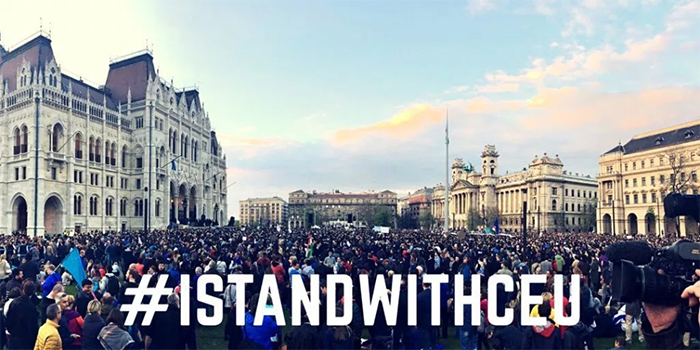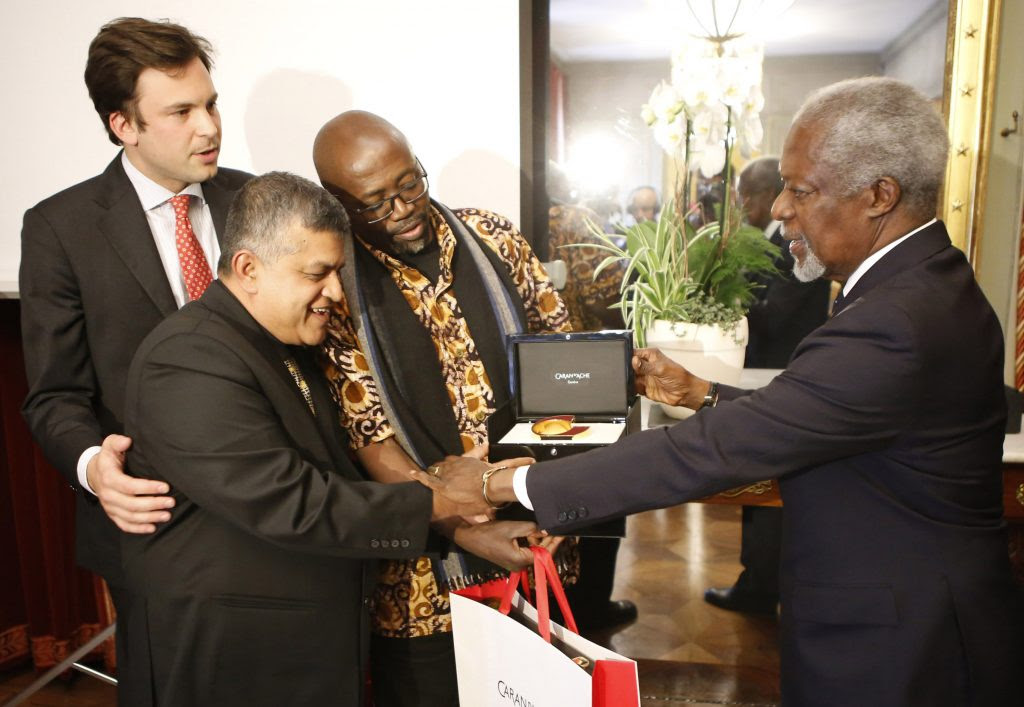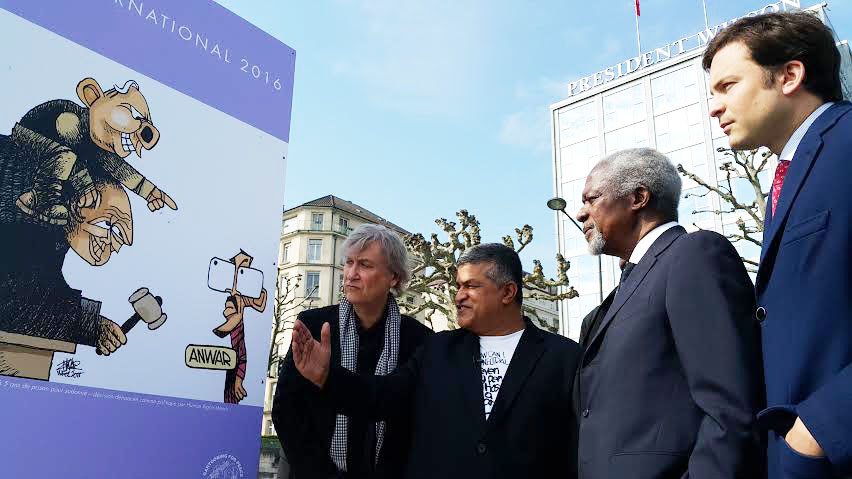Index relies entirely on the support of donors and readers to do its work.
Help us keep amplifying censored voices today.
[vc_row][vc_column][vc_column_text]
As a new law passed by Hungarian prime minister Viktor Orbán’s government threatens the existence of Central European University in Budapest, 70,000 people marched in protest in the capital to save it as part of the #IStandWithCEU campaign.
Among those offering supportto protect the academic freedom of one of central Europe’s most prominent graduate universities, either by writing letters or demonstrating, include more than 20 Nobel Laureates including Mario Vargas Llosa, hundreds of academics worldwide, the European Commission, the UN, the governments of France and Germany, 11 US Senators, Noam Chomsky and Kofi Annan.
Whilst the amendment, which will effectively force CEU to shut, has been signed into statute by Hungarian president Janos Ader, the university hopes to challenge the law in the Hungary’s Constitutional Court.
In a video released on 20 April, Michael Ignatieff, president and rector of CEU, said: “Three weeks ago this university was attacked by a government who tabled legislation that would effectively shut us down. We fought back and the reception around the world has been just magnificent.”
He added: “Academic freedom is one of the values we just can’t compromise.”
Orsolya Lehotai, a masters student at CEU and one of the organisers of the street protest movement Freedom for Education, told Index that initially the small group of students had hoped to “mimic democratic society” and stop the law passing in its original form.
“So far in the seven years of the Orbán government, whenever there was big opposition to something, people have taken to the streets and this has actually changed legislation, so we decided it would show a little power if we were to have people in the streets about this,” Lehotai said. “Back then [at the first protest] we were unsure when the parliamentary debate was to happen but we had had news that it was to happen on a fast-track, which to us was outrageous.”
Despite the protests and international criticism, the Hungarian government said that the law is designed to correct “irregularities” in the way some foreign institutions run campuses. Government officials maintain that the legislation is not politically motivated.
Áron Tábor is a Fulbright scholar and another CEU student who has taken to the streets. He spoke to Index about the absurdity of the Hungarian government’s stance: “This is one university, where the language is instruction is English and the programs run according to the American system.The government says that CEU is a ‘phantom university’, or even a ‘mailbox university’, which doesn’t do any real teaching, but only issues American degrees from a distance. This is a ridiculous claim.”
Gergő Brückner, a journalist at Index.hu described the political paranoia that lies behind the new laws: “One important thing to know is that Fidesz doesn’t like anything that is not part of their own Fidesz system. You can be a famous filmmaker, a university researcher or an Olympic medal winner but you must, for them, be the part of the national circle of Fidesz.”
“If you are an independent and well-funded American university – then you are not controlled, and you can easily be portrayed as a kind of enemy,” he added.
Since its establishment in 1991, CEU has made no secret of its commitment to freedom of expression. It was founded by a group of intellectuals including George Soros, who has been much criticised by Orbán.
The university was designed to reinforce democratic ideals in an area of the world just emerging from communist control. This ethos continues: in February the annual president’s lecture at CEU was given by the University of Oxford academic Timothy Garton Ash who spoke on the topic of “Free Speech and the Defense of an Open Society”.
When the law comes into force, requirements for foreign higher education institutions to have a campus in their home country mean that it will be impossible for CEU to continue operating.
Similarly, requiring a bilateral agreement between the government of the country involved, and the Hungarian government is a huge obstacle, as in CEU’s case this would be the USA but the US federal government has made it clear that it is not within their competence to negotiate this.
More generally, the ability of the Hungarian government to block any agreement raises worrying possibilities, too. Professor Jan Kubik told Index: “A democratic government has no business in the area of education, particularly higher education, except for providing funds for it. When a government tries to play an arbiter, dictating who does and who does not have the right to teach that is a sure sign of authoritarian tendency.”
Kubik, director of University College London’s School of Slavonic and Eastern European Studies, along with over a thousand other international academics, has strongly criticised the new legislation, and his department is holding a rally in London on April 26.
He has also signed an open letter published in the Financial Times.
He said: “Any governmental attempt to close down a university is always very troubling. An attack on a university in a country that has already been travelling on a path towards de-democratisation for a while is alarming.
“Universities are like canaries of freedom and independence of the public sphere. Their death or weakening signals trouble for this sphere, a sphere that is indispensable for democracy.”
With the international condemnation of the Lex CEU amendment and a likely protracted legal battle ahead, what Kubik called “a magnificent institution of higher learning, as devoted to the freedom of intellectual inquiry and high ethical standards as any of the best universities in the world” is not expected to shut its doors this year.
Meanwhile, those fighting for fundamental freedoms in Hungary will continue to challenge Orbán. European Commission vice president Frans Timmermans said, CEU has been a “pearl in the crown” of central Europe that he would “continue to fight for”, and for as long as global opinion remains so loudly behind CEU, Orbán will find it an institution difficult to silence. [/vc_column_text][/vc_column][/vc_row][vc_row][vc_column][vc_basic_grid post_type=”post” max_items=”4″ element_width=”6″ grid_id=”vc_gid:1493126838618-e2c5cf5d-d00a-0″ taxonomies=”2942″][/vc_column][/vc_row]

Zunar receiving the award from Kofi Annan, secretary-general of the United Nations, at the Palais Eynard, Geneva
Malaysian cartoonist Zulkiflee Anwar Haque, aka Zunar, has won the 2016 Cartooning for Peace Prize.
The award was presented at a ceremony at the Palais Eynard in Geneva on Monday 3 May 2016 by the honorary president of the Swiss Foundation Cartooning for Peace and former secretary-general of the United Nations Kofi Annan.
Annan said the award — jointly won by Kenyan cartoonist Gado — “reminds us how fragile this liberty remains in Africa and in Asia as well as in other regions of the world”.
“Through their commitment towards open and transparent societies, Gado and Zunar, who have received threats in their countries of origin and can no longer practice their profession, confront us with our responsibility to preserve freedom of expression and act in order to support the combat of those who cannot express themselves through their art,” Annan added.
Zunar has been repeatedly targeted with arrest, detention and harassment for his cartoons which are critical of corruption and abuses of power committed by the Malaysian government. He is currently facing nine charges of sedition for criticising Malaysia’s judiciary over the recent incarceration of a Malaysian opposition leader and faces a possible 43 years in prison if found guilty.
The cartoonist said the Cartooning for Peace Prize gives him “strength for me to continue the fight against the 60-year old corrupt and repressive Malaysian regime”.
He said human rights and freedom of expression are in “dire straits” in Malaysia and the country’s institutions and draconian laws such as the Sedition Act are routinely used as a tool to “silence critics” and “maintain power”.

“Talent is not a gift, but a responsibility,” Zunar added. “It is a duty for me as a cartoonist to use the art as a weapon to fight unjust rulers. Fear and intimidation are the potent tools being used by the regime to scare the people.”
“I also strongly believe that, when faced with a moral crisis, there is no room to grumble in silence. We have to stand up and cry our voice out loud and clear. Neutrality is escapism for those who live in a comfort zone.”
Zunar has spent two periods in Malaysian jails, firstly in September 2010 and again from 10 February 2015. Several of his books have been banned while bookstores carrying his works have been raided and three of his assistants were arrested in October 2014 for selling his books. The webmaster, who manages his website and online bookstore, has been interrogated by Malaysian police.
Zunar has previously been awarded the 2011 Courage in Editorial Cartooning Award by Cartoonists Right Network International, the 2011 and 2015 Human Rights Watch Hellman/Hammett Award, and the 2015 International Press Freedom Award by the Committee to Protect Journalist.
Zunar received a standing ovation at Index on Censorship’s Freedom of Expression Awards in London in April.

Zulkiflee Anwar Haque, aka “Zunar”, upper right, is saluted by the audience. (Photo: Elina Kansikas for Index on Censorship)